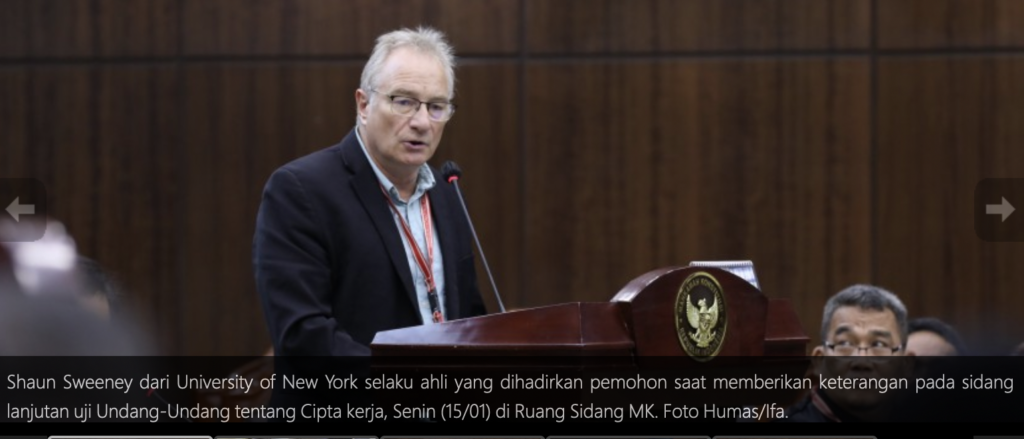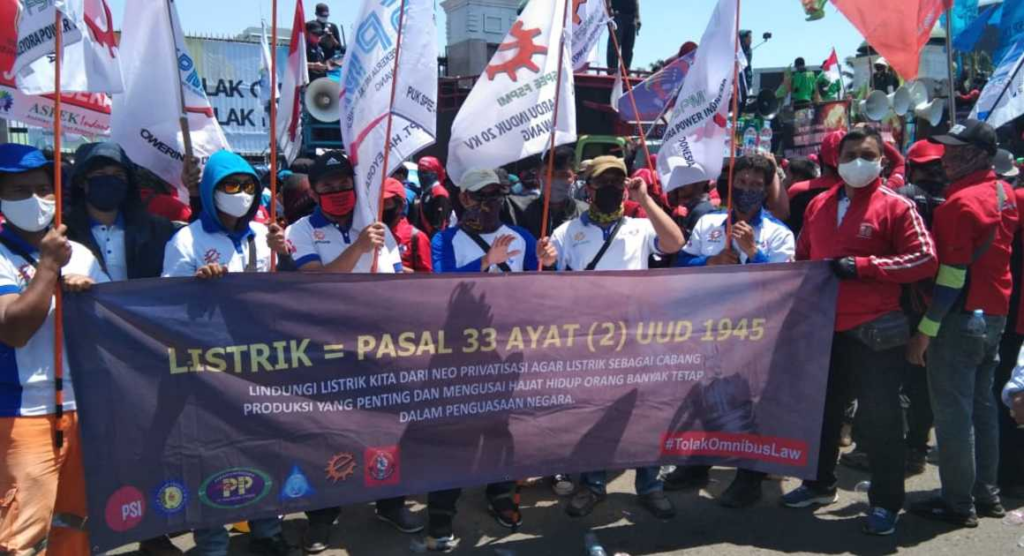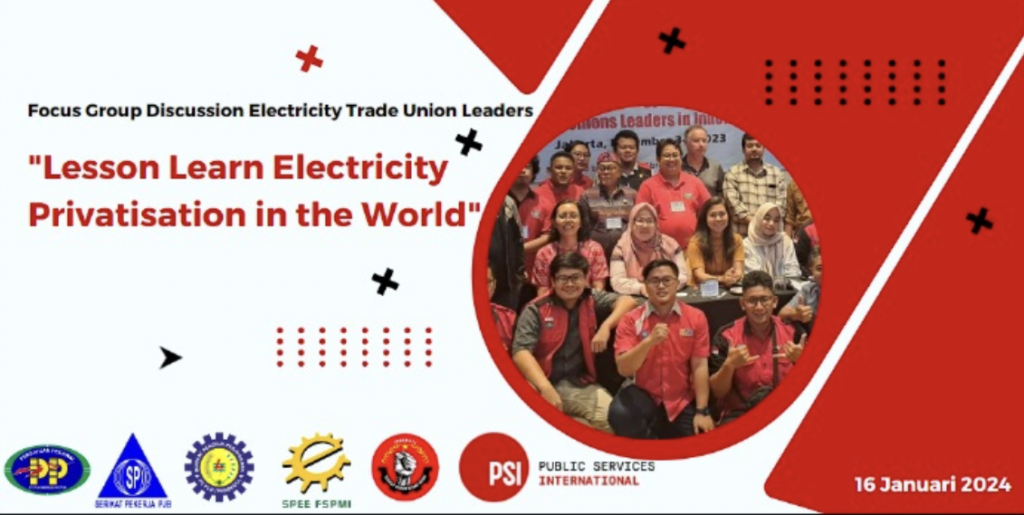Broad coalition organises to defend public energy clause in Indonesian Constitution, oppose pro-privatisation electricity reforms.

Following yesterday’s elections in Indonesia, we turn to the country’s energy sector and the Indonesian labor movement’s fight to defend public energy against the threat posed by the “privatise to decarbonise” agenda reflected in the Just Energy Transition Partnership (JETP) between the rich countries and the Indonesian government.
TUED and the Indonesian Energy Unions
In mid-January 2024, TUED supported a broad coalition of trade unions, academics and public figures that petitioned Indonesia’s Constitutional Court to declare unconstitutional the electricity sector reform provisions in Law Number 6 of 2023.
Known as GEKANAS, the coalition’s petition reflected concerns that the new law would lead to the “unbundling” of PLN, the public power utility, and increase the role of the for-profit independent power producers (IPPs.) The coalition’s effort is supported by power sector unions, namely:
- PT Perusahaan Listrik Negara (Persero) or SP PLN
- Indonesia Power or PP IP,
- The PT Pembangkitan Jawa Bali

Article 33 of Indonesia’s Constitution states that the country’s vital resources should be controlled by the Indonesian state. Appearing as an expert witness before the Court in Jakarta, TUED coordinator Sean Sweeney drew attention to the “privatise to decarbonise” agenda embedded in the Just Energy Transition Partnership (JETP) between the rich countries and Indonesia. This, suggested Sweeney, lies behind the energy provisions of Law Number 6 which, he said, would “eviscerate Article 33.” A video of Sweeney’s intervention Constitutional Court is available here.
Strings Attached

Sweeney told the court that JETP financing from rich countries comes with strings attached, as seen in the South African case. Announced in November 2021, the JETP with South Africa, the first of its kind, set the tone. It states that financing would be contingent upon unbundling of the public utility, Eskom. The JETP statement between the rich countries and the Government of Indonesia called for a “clear strategy for private sector engagement,” detailing “policy reforms necessary to address any regulatory barriers.”
In November 2022, at the G20 Summit in Bali, a group of developed countries—led by the US and Japan—pledged to mobilize US$20 billion over the next 3-5 years to accelerate Indonesia’s energy transition through early retirement of coal power plants and deployment of renewable energy. Currently, the public utility PLN generates about 65% of the country’s electricity, down from 92% in 1990. The presence of IPPs has grown to 35% of generation. The JETP is designed to accelerate the growth of the for-profit IPPs.
In Indonesia’s case, the utility PLN is encouraging the growth of IPPs as seen in the PLN’s Electricity Power Supply Business Plan (RUPTL), 2021–2030, from October 2021. The World Bank and its regional Asia Development Bank (ADB) “will simultaneously target pioneering large-scale RE and storage (RE+Storage) projects led by the private sector that will aim to serve demand both in grid-connected and captive power contexts.”

Why would PLN wish to further undermine its position in the power sector? The RUPTL notes that the World Bank and ADB is “preparing a results-based lending (RBL) program to support PLN in accelerating Indonesia’s clean energy transition.” Periodic loan disbursements will be contingent upon “satisfactory performance.” The ADB partnership with the Government of Indonesia notes that “ADB support will center on policy reforms toward stronger energy sector governance, clean energy and energy efficiency, and private sector participation, while the investment focus will be on sustainable power generation, power transmission systems, and electricity grids.”
The JETP, Article 33, and Private Sector Participation

The designers of the JETP with Indonesia do not want to explicitly confront Article 33, said Sweeney, but the innocuous language of Law No 6, allows for private sector “participation” in the electricity system will allow this objective to be achieved via the “back door.” Read the official court press release on Sweeney’s intervention.
In his written submission to the Court, Sweeney stated that by 2030, PLN’s role will be reduced to being mainly a buyer of electricity (as the “off-taker”) from privately owned generators. This would mean the state would no longer have control over its electricity system.
Released in late November 2023, the Indonesia JETP Comprehensive Investment and Policy Plan, explicitly states: “A PPA [power purchase agreement] should not be treated by its contracting parties as a procurement of a ‘project’ or an ‘asset’ that PLN would eventually own but rather as a procurement of electrons.” In other words, electricity will no longer be seen as a public good generated for human development and nation-building; rather, electricity will become a commodity that PLN is legally obligated to purchase from private companies.
Sweeney’s submission also provided data that pointed to the failure of the “blended finance” model that informs the JETP. The $20 billion dollar JETP package would add to the country’s debt obligations while leaving Indonesia to find an additional $97 billion to finance the transition away from coal.
Public Pathway as an Alternative to JETPs

Sweeney then explained that Indonesia and other coal-dependent countries in the Global South could pursue an alternative “public pathway” approach where state control and public financing can be the drivers of economy wide decarbonisation based on prudent energy planning within a framework of global public goods.
The need for this policy shift is made evident in the data on global energy trends, he said. These trends indicate that we are witnessing an energy transition, but an energy expansion. Fossil fuel use is rising, not falling. Greenhouse gas emissions (GHGs) also continue to rise, making the Paris Agreement targets almost meaningless in the short term.
Indonesian Trade Unions Fight Back

The Indonesian labor movement and its allies continue to organize in defense of Article 33 and PLN’s role as the principal energy provider.
On January 17th, roughly 60 union leaders gathered for a discussion on “ Lessons Learned from the Privatisation of Electricity around the World” – and the Public Pathway alternative.
Said Andy Wijaya, the General Secretary of Persatuan Pegawai Indonesia Power: “Once I was told by a Parliament member that if a State-Owned Company is privatized, the wage would increase sevenfold. I said that currently I am working in PT PLN, and I am paid. But there is no guarantee that my children, my family will be able to get a job at PT PLN that is also well-paid, just like me. Especially if PLN is privatized. I will feel very guilty if in the future, our children will have to pay expensive electricity price because PLN is privatized and I don’t do anything to stop it.”
“Public sector unions play a pivotal role for social justice and public energy that improves people’s lives. Therefore, we need to stay strong in defending public services with pure vigour and use all our powers as unions to keep public energy and services in the hands of the public. Our work with affiliates in Indonesia is to fight againts privatisations and towards a Public Pathway alternative that democratises public services,” said Indah Budiarti, Project Coordinator of the PSI Southeast Asia Office and based in Indonesia. Read Budiarti’s insightful article, “Analyzing the Dynamics of Indonesian Energy: Between Government’s Subsidy, Privatization, and Ecological Sustainability”.
In solidarity,
The TUED Team
Trade Unions for Energy Democracy (TUED) is a global, multi-sector trade union initiative to advance democratic direction and control of energy in a way that promotes solutions to the climate crisis, energy poverty, the degradation of both land and people, and responds to the attacks on workers’ rights and protections. TUED is is part of the Global Labour Institute Network.


